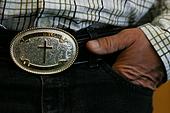
Commentary by Cantice
Some of my Christian friends don’t like that some statesmen and women “legislate Christianity.” I’ve never really asked them what they mean. But I’ve supposed that they mean that Christian statesmen and women fight to make things like partial-birth abortion illegal, and they support legislation that defines marriage as between a man and a woman. A notable local move from a Christian power perspective happened in Cobb County two years ago. Educators placed the sticker “Evolution is a theory not a fact…” on high school science text books. The gesture was an attempt to present multiple perspectives on the origin of humanity and to include within those perspectives intelligent design. Later citizens commenting on the move said they were embarrassed by the sticker and felt that it set back the school system in terms of its academic progress. Many supported these statements, feeling that any reference to creationism constituted an effort to teach religion.
The other day I came across a title by Josh McDowell called The Last Christian Generation and it got me to wondering. What exactly does a secular generation look like? In this country, a majority of the population continues to classify itself as Christian, but research by George Barna and Associates continues to challenge our assertions. Questions like, do you believe that the Bible should dictate personal behavior, and, do you believe that all religions lead to God, uncover that the balance is shifting, and according to Josh McDowell, will soon tip the scales in the favor of secularism. Secularism deprivileges a God-fearing/believing perspective which leaves behind immorality. I believe that we have only begun to see sexual, economic, and relational immorality in American culture. But to me it doesn’t seem foreign. Readers of The Old Testament have seen snapshots of immorality in vivid color as often as they have chosen to remind themselves why we need a Savior. Whether in the account of the Children of Israel who began to sell their children in order to pay their taxes (Nehemiah 5) or in Genesis 19 when the men of the city beat on Lot’s door to “know carnally” the two angels that had come to visit him, secularism is gross in the most genuine sense of the word.
One thing that educators, parents and ministers must pass on to young adults today is that no one exists without bias. We are all colored by our experiences and understanding of the world, which is also known as ideology or religion. That ideology/religion may be Christian environmental, secular homo-normative, radical queer, feminist capitalistic, or anything outside or in between. Somewhere along the way we began believing that post-modernism allowed us to see the world as fragmented and that we could belong to two or more contradicting groups (ironically, in the last decade, we have also seen a rise in reported bipolar disorders). Somehow today we expect people to turn off their ideologies if they’re Christian. But why should Christian people in power claim that they can not make decisions based on their religion, when that is what secular people do all the time? If a person is not voting values, just what exactly is guiding that vote?
Response
By Wanda
Whistling, humming, tapping pencil on table, while gazing out of window and chewing gum, now blowing a bubble, admiring the size of the bubble, pops the bubble, continue chewing…. Oh yeah, I’m sorry Cantice wants me to respond to this prophetic call to utopia. Cantice, I don’t understand why you don’t just kill me now, why do you insist on torturing me.
As I boldly indicated in a recent blog, just voting on issues of abortion and same-sex unions is a joke. I don’t know if I agree totally with the term “legislating Christianity” but I get the point. However, readers, you should have once again noticed that Cantice does not acknowledge the socio-economic issues that also tie into our faith. If these “statespersons” were truly moral they would enact the ministry of Jesus. They would take care of the poor and the widows, reach out to the foreigner and embrace them as family. Many of our “moral statesmen” suffer from hatred of the poor, disregard for the (poor) elderly, xenophobia and the list goes on and on and on…Additionally, Cantice complains “Why should religious people in power claim that they can not make decisions based on their religion, when secular people do all the time?” I am going to say something very shocking, “CHRISTIANS ARE NOT IN COMPETITION WITH THE WORLD!!!” Are you reading the bible? You know the bible that we all firmly state is our moral compass. You might want to check out the Beatitudes in Matthew, or just look at Paul’s life, or read the gospels. Christians are anti-normative, against the trends, a subculture. But if you listen to many you believe that we should run the world. Give me a break. Experiencing resistance is nothing new for Christians, the early church dealt with it, radical protestant movements experienced it and 20th century holiness endured it…so get over it!
A true moral leader embodies morality in every area that affects our society – and in this day and age that type of leader is an enigma (if you can find one I say we tie her down and study her DNA.) Being moral is a way of life, not an “anti–something” slogan. Standing up against partial birth abortion and same sex unions does not conclusively make you a “moral” statesperson. And finally, I agree that people should vote values – the right to life, right to healthcare, right to quality education, and the right to provide for their families.


